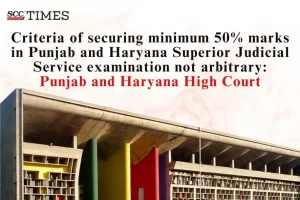Punjab and Haryana High Court: A petition was filed by the petitioner challenging Clause 8.4 of the notifications issued for the States of Haryana and Punjab for direct recruitment of Additional District and Sessions Judge imposing ‘minimum marks qualification’ of 50 per cent marks in aggregate for being in contravention of Haryana Superior Judicial Service Rules, 2007 (‘Haryana Rules’) and Punjab Superior Judicial Service Rules, 2007 (‘Punjab Rules’). The Division Bench of Sheel Nagu, CJ., and Sanjiv Berry*, J., held that the said notifications were not at all arbitrary in nature but were in consonance with the respective Service Rules to choose the best available talent for performance of the duties as a Member of Superior Judicial Service. Accordingly, the Court dismissed the petition.
Background
In the present case, the petitioner had appeared in the competitive examination conducted for appointment of the Additional District and Sessions Judge in Haryana as well as Punjab, as advertised through the notifications concerned, in quota for appointment by way of direct recruitment.
In the written examination, the petitioner secured 344.5 marks in Haryana and 340.5 marks in Punjab out of total 750 marks. He had scored the requisite 40 per cent marks in each paper. However, the petitioner was declared unsuccessful after result of written examination and viva-voce on the ground that he obtained less then 50 per cent marks in aggregate out of total marks fixed for written test and viva-voce as per Clause 8.4 of the impugned notifications. Aggrieved by the same, the petitioner approached this Court.
The petitioner challenged the said notifications imposing ‘minimum marks qualification’ under Clause 8.4 being arbitrary and not sustainable in the eyes of law, on the ground that the same was not in consonance with the Punjab Rules and Haryana Rules. He argued that he had topped the Delhi Higher Judicial Service Examination, 2023 and had cleared the written examination in the Punjab and Haryana, therefore, the reassessment of the answer-sheet was essential in the interest of equity and fair play.
Per Contra, the respondent contended that the petitioner had already filed a petition in the Supreme Court, which already stood dismissed without there being any liberty granted to the petitioner, thus, the petitioner was estopped from filing the present petition.
Analysis and Decision
After considering Clause 8.4 of the said notifications, Rules 7 and 11 of Haryana Rules and Punjab Rules, respectively, the Court specified that the said Rules were identical and stated that the High Court could further hold written examination test and viva-voce for appointment under the respective Rules. Further, the Court emphasized that the said clause specified that merely securing 40 per cent or more marks would not confer any right to be called for viva-voce, thus, this Court had the discretion to shortlist the candidates equal to three times the number of vacancies for viva-voce.
The Court stated that it further provided that no candidate would be considered to have successfully qualified the Superior Judicial Service Examination unless he or she obtained 50 per cent marks in the aggregate out of the total marks fixed for the written test and viva-voce and that the candidates would be appointed in the order of merit in which they were placed after the conduct of written test and viva-voce.
The Court thus, opined that the said conditions of minimum marks qualification imposed under Clause 8.4 of the said notifications was not at all arbitrary in nature, rather was in consonance with Rule 7 of Haryana Rules and Rule 11 of Punjab Rules respectively.
Further, the Court pointed that the Supreme Court dismissed the petitioner’s petition challenging the selection process of the Punjab Superior Judicial Service and Haryana Superior Judicial Service Examination 2023-2024 conducted based on the said notifications, as challenged in the present case. Therefore, the Court held that once the Supreme Court had dismissed it, the petitioner was estopped from agitating the issuance of the said notifications in the present petition as well.
The Court observed that it was evident that by laying down the syllabus and format of examination, the High Court specified the scheme by inserting the said clause in the notifications and in doing so, it did not violate the basic Rules. However, the same had been done in exercise of its powers in the light of the Constitutional Scheme so that the best available talent could be selected for performance of the duties as a Member of Superior Judicial Service and for that purpose, imposition of ‘minimum marks qualification’ in written examination and viva-voce did not in any manner became irrelevant to adjudge the merit and suitability of any candidate for such post nor the same was in contravention of the basic Rules in any manner as had been envisaged under the Superior Judicial Services Rules of the respective States.
Therefore, the Court stated that the High Court was open to prescribe the criteria including cut off marks and ‘minimum marks qualification’ as had been envisaged in Clause 8.4 of the said notifications to assess the merit and suitability of the candidates to be appointed in the Superior Judicial Services to perform the sacrosanct duties of Judicial Officer. Accordingly, the Court dismissed the petition.
[Rushil Jindal v. Punjab and Haryana High Court, 2025 SCC OnLine P&H 9113, decided on 22-9-2025]
*Judgment authored by Justice Sanjiv Berry
Advocates who appeared in this case :
For the Petitioner: Aashish Chopra, Sr. Advocate, Arav Gupta, Advocate and Yash Pal, Advocate
For the Respondents: Munisha Gandhi, Sr. Advocate, Shubreet Kaur Saron, Advocate and Manveen Narang, Advocate

